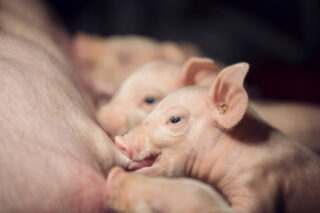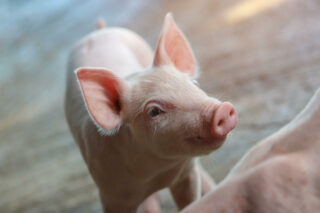Large litters
mean big challenges
The birth process poses a significant challenge to piglets, particularly the firstborn. It must stretch the birth canal to pave the way for the littermates, making its birth process harsh and prolonged, especially when born to first-time mothers. The subsequent births are typically swifter, but then the sow’s endurance becomes a factor when delivering large litters which could lead to exhaustion. Towards the end of the birthing process, this exhaustion can even cause dystocia— interrupted, abnormally long and difficult births—which can cause hypoxia. When severe, hypoxia can result in stillbirths and, when moderate, results in piglets who are often disoriented and struggle to find warmth and nurse.

Disadvantaged at birth
Due to their inactive digestive system, newborn piglets have a lower metabolic rate (40% lower) than healthy one day-old piglets. This makes them more susceptible to hypothermia. Colostrum helps turn on their digestive machinery, raise their metabolic rate, and enhance their resilience against hypothermia. Piglets born after a difficult birth process are at a disadvantage because their littermates (who were born smoothly) are able to quickly drink colostrum, boosting their metabolic activity and immune health; widening the gap in health between them. Additionally, the supply of immunoglobulins is limited and drops each hour the sow is nursed.
Ironman award
The birth process for hyperprolific sows is like an ironman competition and we should manage sows in the same way as athletes. We should ensure the sow has maximum energy reserves, such as glycogen, before parturition and ideally provide energy and mineral supplements during the birthing process. By maximizing the sow’s immune health, an increase in the quantity of immunoglobulins excreted in the milk can be achieved to provide weaker piglets a better chance to recover from their difficult start.

Supporting the underdog
The birthing process is challenging for piglets, and difficult births can have long-lasting effects on their health. Colostrum is essential for piglet immune health, and to turn on their digestive machine, which inhances their metabolic activity. The proper management of sows and maximizing their immune health can increase the number of immunoglobulins excreted in milk, providing weaker piglets a better chance to recover from their difficult start.